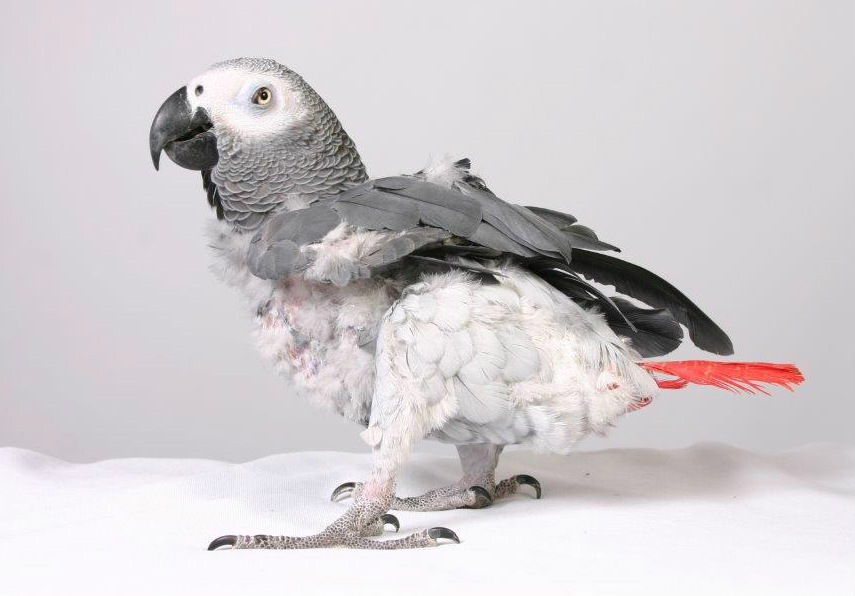African Grey
Myths |
|
So many myths surround this sensitive and intelligent companion bird. Some of these myths have assumed the status of fact by virtue of repetition, but repetition does not make them true. Some of the most common myths are "Greys are clumsy", "Greys need more calcium", "Greys pluck", "Greys are one person birds" and "Greys are shy". Nothing could be further from the truth. MYTH II - GREYS ARE PLUCKERS. Plucking seems to occur more often in Greys because they must be managed more carefully than other species. Internal conflicts involving environment, cage, diet, activities, bathing, discipline, training, and amusement produce internal disharmony and anxiety. The companion Grey may internalize these events and be unable to resolve them in a non-destructive manner. When something is amiss, they may express their discomfort or anxiety by feather plucking. Greys need to be helped, more than other species, in developing their sense of self and self-confidence. They need to be encouraged to explore and to express their curiosity. They need to be exposed to change, movement, color and variety and to learn that these are not things to be feared. A good breeder will get a bird off to a good start. It is up to the new owner to continue to expose the bird to variety and change. While much plucking is behavioral, a medical cause must first be ruled out. So a trip to an avian vet is the first step in the process. There is a listing of board certified avian vets at: http://www.abvp.com/ or http://www.birdsnways.com/articles/abvpvets.htm. While board certification provides no guarantee, it may reassure the owner that the vet has experience and knowledge of birds. Collaring or drugs in the absence of skin mutilation should be the last option - not the first. Physiological feather chewing or plucking may be caused by: kernel peanuts, seeds or nuts (in the shell) contaminated with mycotoxins, low blood calcium, some bacterial/viral/fungal infections, allergic-type reaction to preservatives or artificial colors, heavy metal poisoning, internal or external parasites and dry itchy skin associated with molting or infrequent baths. If the cause may be a psychological one, change the environment or location of the cage to a more protected spot, increase out-of-cage time and bird/human interaction, buy new toys (no rope or cloth toys), put the bird in a busier part of the house (the place where you spend the most time) but place the cage against a wall or in a corner for a feeling of security. Position the cage where the bird has a longer range view of those who enter his living area. Avoid a location where there is a lot of traffic back and forth past the cage. The sudden appearance of family members, guests or other companion animals can contribute to uneasiness and insecurity. Reduce stress from the presence of other companion animals, children, pressure to socialize with a disliked person, arguments/shouting/loud voices or household commotion. Provide a widely varied soft food diet that is comprised of birdie bread, beans/grains/pasta/veggies mixture, sprouts, fresh fruits and veggies. Choose fruits and veggies high in Vitamin A for their immune system benefits. A plucking bird is usually a stressed bird and may need the immune system boost that high Vitamin A foods provide. Often seeds are implicated in plucking. Some birds can have an allergic-type reaction to some components of seeds or the seeds may be contaminated with mycotoxins. A safe nutritious seed is straight canary (no colored seeds). These seeds provide unsaturated fat and a high level of protein. They are quite small and will distract a bird from plucking his feathers. http://www.inkanatural.com/en/arti.asp?ref=canary-seed-en Peanuts are often a culprit. They may be contaminated with mycotoxins and other bacterial or fungal organisms. Remove all kernel peanuts from the diet. Remove all nuts in the shell from the diet. Mycotoxins again are of concern. Hard-shelled nuts appear to be impermeable but how often have you opened a nut to find fungal growth or spoilage? I don't recommend that birds be fed kernel peanuts or dry seeds or nuts in the shell. Offering Planter's type nuts from the supermarket may be safer if you choose not to remove nuts from your bird's diet. Do not offer Brazil nuts - these and peanuts are "notorious sources of aflatoxins". Ref. Avian Medicine pages 536 and 1043. For information on fungal organisms, a listing of URLs is included at the end of this section. All rights reserved. No part of this article may be reproduced in any form or by any means, without permission from the author. |
